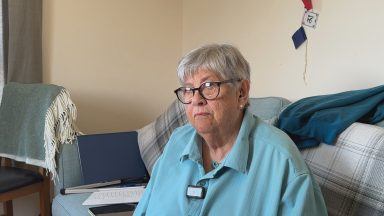A man who committed sex offences against 28 underage girls has avoided a prison sentence due to his “previous good character and young age”.
George Low coerced schoolgirls – aged 13 to 16 – to view footage of him performing sex acts before threatening those who refused to reciprocate.
He targeted them over a three-year period on social media websites such as Instagram, Facebook and Snapchat.
Low was released from detention on Tuesday after spending the equivalent of a 30-month sentence on remand.
He was made subject to intense social work supervision for three years and told his name would remain on the sex offenders’ register for the same period.
The sheriff chose not to impose a prison sentence despite warning the defendant that he remained at “very high risk of reoffending”.
Low’s last offence targeted a 13-year-old girl while he was on bail for earlier offences.
Passing sentence at Livingston Sheriff Court, Sheriff Jane Farquharson told Low he had accepted responsibility for indecently coercing young girls into looking at sexual images.
She said: “Albeit these are non-contact offences, they are sexually motivated, the seriousness of which is reflected – notwithstanding your previous good character and your young age – in your appearance in this court on petition and then indictment.
“In summary, your offending spans from the summer of 2018 when you were just 15 years of age, until and shortly after your first appearance in court on petition on 17 December, 2021 and by then 18-and-a-half years old.
“I must take into consideration in respect of the last charge that you were on bail and had been given therefore, the trust and confidence of the court, in respect of a vast number of directly analogous offences.
“Of particular concern to me in sentencing you is your continued interest in young girls, that it would appear from this charge has persisted into your adulthood.
“Put frankly: as you have got older, the victims of your sexual interest have not aged accordingly.”
Sheriff Farquharson said she appreciated that Low had faced “particular pressures that no child in our civilised society should have to endure” in his early years.
She told him: “You are the victim of neglect and a lack of care at home. You have experienced domestic abuse, neglect and bereavement as a child.
“You have had an entirely disjointed education, and spent much of your time in and out of foster care. You have not had the benefit of a supportive family or a pro-social group of positive peers.
“I understand that your traumatic childhood is likely to have impacted on your ability to regulate your emotions.”
She continued: “I note that much of your offending is highly impulsive and that there is a theme, in terms of how you have then reacted to what might have been perceived by you as a rejection. But you must understand, Mr Low, as difficult as your life has been, that does not excuse your behaviour.
“You have to take responsibility for your actions and part of that will be to find better ways to cope with the challenges of your past.
“That first step has, of course, been taken by you in acknowledging your guilt but, given the nature and number and circumstances of your offences, you remain a very high risk of reoffending if you don’t address now – and learn from – those mistakes of your past.”
Sheriff Farquharson said the maximum sentence she could impose on Low was a term of 60 months imprisonment.
But given the discount he was due from the timing of his guilty pleas, his relatively young age and the fact that he had arguably served the bulk of any custodial sentence that she could impose, she said it was appropriate that her focus should shift to give effect to his rehabilitation.
Sheriff Farquharson added: “This is by no means, Mr Low, to ignore the impact of your offending on your child victims. What you asked of others, what you sent them and how you responded when they took exception is very serious and had a significant and detrimental effect on their well-being.
“But you have to date served an extended period of time in custody, equivalent to a punishment for your wrongdoing. You must understand the almost inevitable consequences for your liberty, if you fail to comply with the terms of the order that I will make today. This will not be easy.”
‘Public will be questioning the leniency of this sentence’
The sentence imposed on Low has been criticised as being too lenient in some quarters.
Scottish Conservative shadow justice secretary Jamie Greene said: “Concerning cases like this once again reaffirm just how ill-advised some sentencing guidelines are in reality.
“They do nothing to assure victims that justice is fully being served, something which SNP ministers seem oblivious to.
“The public will rightly be questioning the leniency of this sentence. The SNP government’s soft-touch approach to justice continues to prioritise the criminals over the victims and their families.
“It is vital that the victims are put first, which is why I’ve brought forward my Victims’ Law to Parliament. We must ensure that they are always at the heart of our justice system.”
Concern over sentencing guidelines
The Low case comes just weeks after the controversial sentencing of Sean Hogg, who raped a 13-year-old girl in a Midlothian park.
He was handed a community payback order because he was under the age of 25 at the time of the offences.
Instead, he was ordered to do 270 hours of unpaid work. He was also put under supervision and the sex offenders register for three years.
The decision sparked furore, with prominent lawyers, rape charities and politicians calling for a rethink.
Updated Scottish sentencing guidelines focus on rehab
Under new court guidance, which came into effect last January, criminals under the age of 25 are treated more leniently because of the immaturity of their brains.
The updated guidelines were drawn up by the Scottish Sentencing Council, which was set up by the Scottish Government and led by Lady Dorrian, the Lord Justice Clerk.
The council is aiming to develop an evidence-based approach on the sentencing of young people. It wants to place rehabilitation as a primary consideration when sentencing young people under 25.
Other factors, such as punishment and deterrence, can continue to be relevant in any given case.
A Scottish Government spokesperson said: “Decisions on sentencing in individual cases are taken by the independent court within the legal framework where they consider all the facts and circumstances and the Scottish Government does not comment on nor intervene in individual cases.
“Sentencing guidelines are the responsibility of the independent Sentencing Council, the establishment of which was backed by all parties in Parliament.”
Follow STV News on WhatsApp
Scan the QR code on your mobile device for all the latest news from around the country


 Google Maps
Google Maps



















